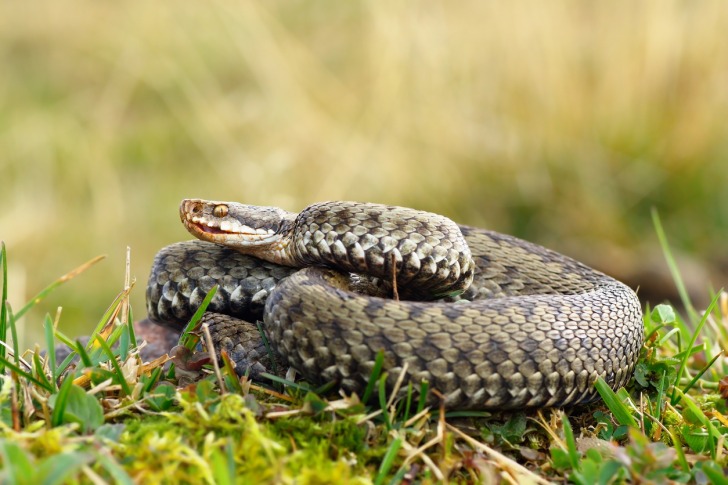One of the more popular European destinations, Germany has been attracting visitors for centuries.
From beer to cars, although not together, there are many reasons for someone to brush up on their German and book a flight.
Another image associated with Germany is the forest.
Many folklore sprung from the magnetic pull of sunbeams filtering through the trees to expose deer and squirrels that live in these regions.
As innocent as that sounds, anyone familiar with these stories knows that both good and bad creatures anchor the tales.

Contents
So… Are There Snakes in Germany?
Simply put, yes.
However, they are quite rare.
Luckily, it’s unlikely people will run into one just casually.
German snakes want to avoid you as much as you want to avoid them.
Snake Species in Germany
Grass Snake
As the name alludes, grass snakes tend to stay in the green stuff.
Especially when that grass borders a stream or lake.
Their diets mostly consist of anything that lives in those bodies of water.
Grass snakes are more or less four feet in length and live an average of 20 years.
Smooth Snake
A snake that blends perfectly with your front yard might be unsettling.
Luckily, the smooth snake can’t hurt you.
At least not permanently.
These snakes can be found as far away as Iran and live up to 30 years.
European Adder
Old stories from England would certainly give you a different impression, but adders aren’t aggressive and not particularly dangerous.
The bite would be extremely unpleasant, as they do come with venom.
It’s just not enough to take you down for good.
You won’t be blamed for accidentally provoking them.
They are only about two feet long.
Dice Snake
Also known as the water snake, dice snakes gravitate towards bodies of water.
They won’t be trying to eat you for dinner, but they are as long as four and a half feet.
Aesculapian Snake
The Aesculapian contains no venom, but it looks intimidating nonetheless.
At an average of six and a half feet long, these snakes blend in with the dirt.
Appearance and a 30-year lifespan might have a lot to do with how symbolic the snake has been over the centuries.
Asp Viper
Vipers are patterned with brown shades and are up to three feet in length.
If bitten, there is only a 4% chance you won’t make it.
However, it’s best to not take the chance with venom and get to emergency services within a few hours.
Is it Safe to Go on a Trek in Germany?
It is most definitely safe to roam around Germany.
Coming upon a snake is rare.
That would make it exceedingly unheard of to go on and get bitten by one.
In all of Europe, only four people die each year from snakebites.

Interesting Snake Facts in Germany
There are only two species in the country with venom.
The European adder can live up to 3,000 meters in altitude.
Adders are also endangered due to climate change since they prefer colder weather.
3 Safety Tips for Exploring Nature in Germany
1. Make Noise
Snakes can hear but not as well as humans.
If they hear you, they will do what they can to avoid you.
So, as you go wandering through the landscape, don’t forge on in silence.
While you won’t want to irritate other wildlife with booming voices or annoying noisemakers, making your presence known will ward off many threatening creatures.
2. Stay On-Road
Offroading may be one way to start an adventure, but it’s not smart to do so on foot.
Going off designated walkways could put yourself and those with you in danger.
These paths are there for a reason and animals have come to associate them with people.
Stepping into unfamiliar territory may make snakes get territorial and want to lash out.
Whether a bite can kill you or not should not make the risk worthwhile.
3. Stay by the Light
Germany has breathtaking views and plenty of scenic hiking opportunities.
These are, of course, best experienced during the day.
Snakes tend to be their most productive after sunset.
So, the highest probability of having a negative experience involving a snake would be after dark.
As hard to resist as it might be, keep your nightlife in the cities.
Summary
To wrap up, yes, there are snakes in Germany.
But no, there is no need to be worried about them.
Not even locals come across them.
Tourists who stick to cities and paths created by experts will almost certainly not encounter a snake.
Even if you do and shockingly are attacked by one, the chances of you not surviving are infinitesimally small.
Germany Safety Overview
READ THE FULL REPORT: Germany Safety Review
Safety Index:
- OVERALL RISK: LOW
- TRANSPORT & TAXIS RISK: LOW
- PICKPOCKETS RISK: MEDIUM
- NATURAL DISASTERS RISK: LOW
- MUGGING RISK: LOW
- TERRORISM RISK: MEDIUM
- SCAMS RISK: LOW
- WOMEN TRAVELERS RISK: LOW
Frequently Asked Questions
What's the rarest snake in Germany?
The dice snake is classified as endangered.
Although, if you were from Italy or other areas in the region, you wouldn’t know that.
Dice snakes are pretty widespread in this part of Europe.
In Germany, though, they have a hard time thriving.
Some of that has to do with having fewer places to live, thanks to expanding populations.
Other parts of the problem have to do with Germany’s climate.
Much of the country is simply too cold.
Are there any places in the world without snakes?
Germany cannot claim to be one of these places, but they do exist.
Everyone with a fear of snakes can book their trips now to Ireland, New Zealand, Iceland, Greenland, or Antarctica.
Taking a look at that list, there is one glaring reason why these places don’t have snakes.
Yes, they are too cold.
Can Germans have snakes as pets?
Coming across snakes during normal daily activities in Germany is unlikely, but looking for them on purpose isn’t.
Snakes are one of the many options to take home and love for Germans.
You can find your next slithering friend at a pet store or, funny enough, at the local hardware store.
Do not try to capture a snake out in the wild.
Snakes bred in captivity are meant to be handled.
Disrupting a snake’s natural habitat and bringing it into yours would likely result in disaster.











